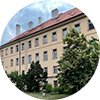Addictionology at VFN celebrates 75 years!

Addiction treatment has a varied and very successful history in the Czech Republic. From just 12 beds for patients in 1948, when the anti-alcohol department at Apolinář was founded, headed by the legendary MUDr. Jaroslav Skála, this workplace (now the Addiction Clinic) achieved results of which it is rightly proud. Despite all the successes
and modernization, even after 75 years, alcohol remains the number one enemy at the Addiction Clinic of the 1st Faculty of Medicine, UK and VFN. But we also have good news: Compared to other countries, the number of patients addicted to illegal drugs is significantly lower in the Czech Republic.
In the beginnings of alcohol addiction treatment at Apolinář, where the first independent anti-alcohol ward with twelve beds was opened in September 1948, apomorphine bark was used based on Pavlov's teachings
about conditioned reflexes. It was a subcutaneous injection (application of apomorphine, which induced vomiting) in connection with the conditioning of the gag reflex thus induced by the vapor and the taste of alcohol. "MUDr became a legend. Jaroslav Skála and the treatment that he and Dr. Janda introduced in 1950 - Antabuse," presented by the head of the Department of Addiction 1. LF UK and VFN MUDr. Petr Popov and continues: "Within four years, the department grew to forty beds. It was initially co-ed for a short time, but soon began to be used only for the treatment of men. The duration of treatment has changed over the years, Dr. Skála tried different treatment models and lengths of treatment, until it settled at 13-16 weeks."
Combination of biological treatment with psychotherapy, work and movement
The most common reason for admission to treatment in Apolinár (and later in Lojovice, which was another clinic where women were treated) was, and remains, primarily alcohol addiction. The age range of the patients was already very wide from the beginning, but it got wider over the years. Today, children and adolescents (children's addictionology) as well as seniors (gerontoaddictology) are treated at Apolinář. Therapy still follows a combination of biological (drug) form with occupational therapy, psychotherapy and movement. Clinic visitors can see the results not only in the decoration of the building itself and the rooms, but also in the garden, which serves to relax clients and their visitors.
